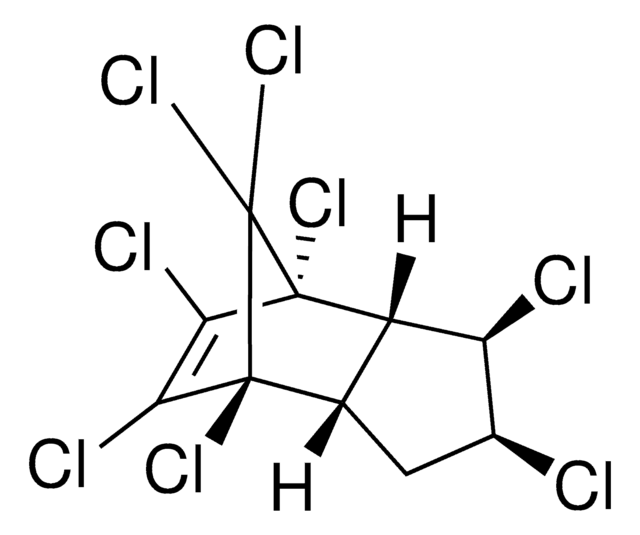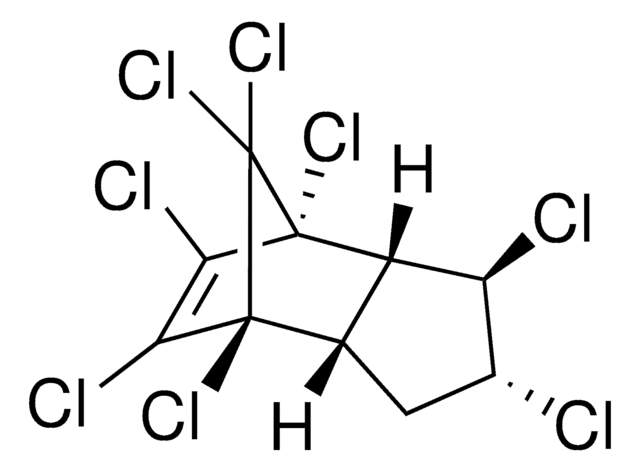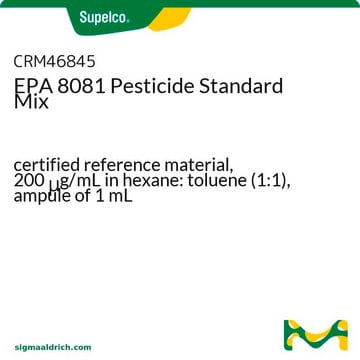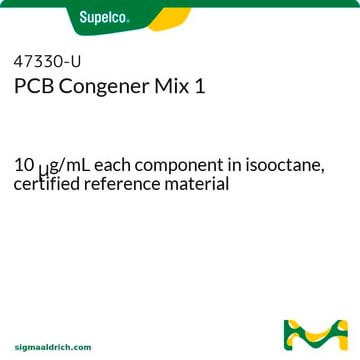53797
Chlordane (mixture of isomers)
certified reference material, TraceCERT®, Manufactured by: Sigma-Aldrich Production GmbH, Switzerland
About This Item
Recommended Products
grade
certified reference material
TraceCERT®
Quality Level
description
technical mixture
product line
TraceCERT®
shelf life
limited shelf life, expiry date on the label
manufacturer/tradename
Manufactured by: Sigma-Aldrich Production GmbH, Switzerland
format
neat
storage temp.
−20°C
SMILES string
ClC21C3C(C(C2(Cl)Cl)(C(=C1Cl)Cl)Cl)CC(C3Cl)Cl
InChI
1S/C10H6Cl8/c11-3-1-2-4(5(3)12)9(16)7(14)6(13)8(2,15)10(9,17)18/h2-5H,1H2
InChI key
BIWJNBZANLAXMG-UHFFFAOYSA-N
Looking for similar products? Visit Product Comparison Guide
Related Categories
General description
Chlordane is a synthetic organochlorine pesticide that belongs to the group of chlorinated cyclodiene. They are commonly resistant to photolytic, chemical, and biological degradation, and have relatively long half-lives. Chlordane manufactured as a technical form is composed of more than 120 structurally related compounds. The predominant isomers in technical chlordane are cis-chlordane (19%), trans-chlordane (24%), cis-nonachlor (2.7%), trans-nonachlor (9.7%), and heptachlor (10%).
Chlordane has to be monitored in the Multiannual Control Programmes for Pesticides Residues (MACP), run within the EU and EFTA in/on products of animal origin. Maximum residue levels (MRLs) have been set according to Reg (EC) No 149/2008 for chlordane (sum of cis-and trans chlordane) for various products of plant and animal origin from 0.01 to 0.005 mg/kg.
Technical chlordane was used mostly as an agricultural pesticide on corn and citrus, for home lawns and gardens, as well as a termiticide in house foundation. Chlordane blocks the gamma-aminobutyric acid (GABA)-gated chloride channels in the central nervous system, resulting in hyperexcitation and convulsions.
The use of chlordane as a pesticide has been banned in the EU since 1981 by Council Directive 79/117/EEC of 21 December 1978 which prohibited the placing on the market and use of plant protection products containing certain substances.
Application
It is intended to be used as a certified reference material (CRM) for calibration in chromatography and other analytical techniques. Chlordane in CRM may also find its use as described below:
- Study of joint toxic effects of polystyrene nanoparticles and chlordane and hexachlorocyclohexane pesticides on Caenorhabditis elegans
- Development of biomonitoring equivalents for chlordane and toxaphene with application to the general Canadian population
- To study chlordane, PCBs, and synthetic musk fragrances in a backwater area in the Upper Mississippi River and Iowa River
- QuEChERS method and a single instrumental analysis to detect a broad range of persistent organic pollutants (POPs) in white sturgeon liver and gonad tissues as an indication of exposure
- To investigate the effect of chlordane, heptachlor, and mirex, on hormonal regulation of the force of myometrial contractions in cow
Legal Information
Not finding the right product?
Try our Product Selector Tool.
Signal Word
Danger
Hazard Statements
Precautionary Statements
Hazard Classifications
Acute Tox. 3 Dermal - Acute Tox. 3 Oral - Aquatic Acute 1 - Aquatic Chronic 1 - Carc. 2
Storage Class Code
6.1C - Combustible acute toxic Cat.3 / toxic compounds or compounds which causing chronic effects
WGK
WGK 3
Choose from one of the most recent versions:
Certificates of Analysis (COA)
Don't see the Right Version?
If you require a particular version, you can look up a specific certificate by the Lot or Batch number.
Already Own This Product?
Find documentation for the products that you have recently purchased in the Document Library.
Our team of scientists has experience in all areas of research including Life Science, Material Science, Chemical Synthesis, Chromatography, Analytical and many others.
Contact Technical Service











